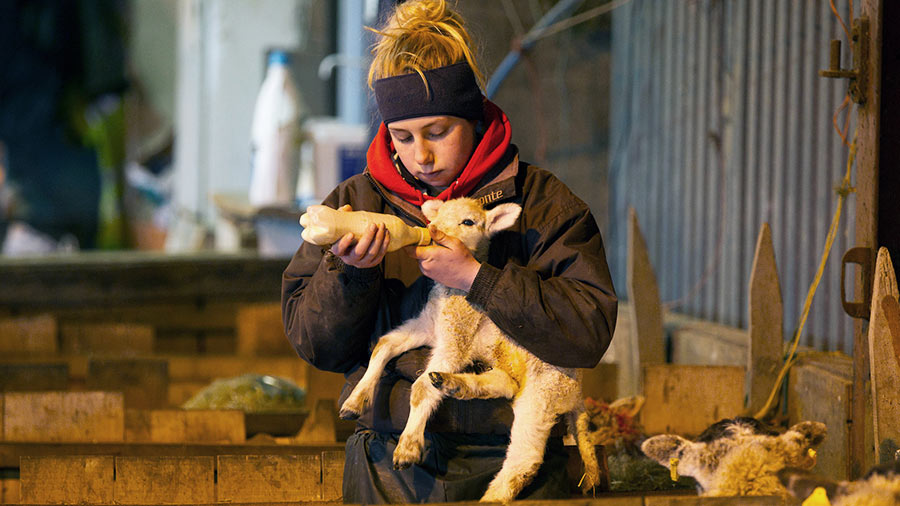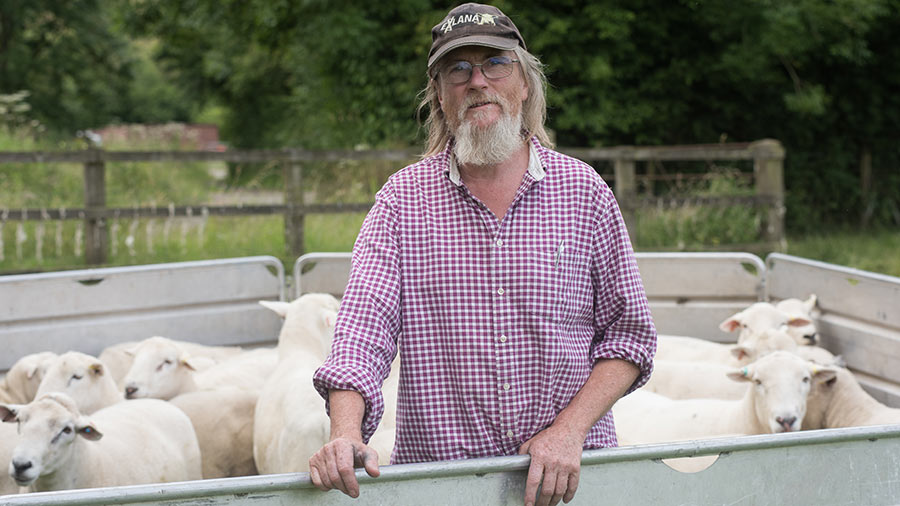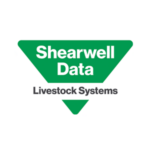10 top tips for aspiring sheep farmers
 © Tim Scrivener
© Tim Scrivener Investing £16,000 in ewes and the basics to farm sheep gave 2021 Farmers Weekly Sheep Farmer of the Year Tim White a route into farming when he was made redundant from his job as a farmworker.
He knocked on doors to persuade landowners to rent him their land and made the business work by standing out from the crowd and using forward-thinking flock management and breeding practices.
For new entrants about to start their own journey, Tim, from Warminster, Wiltshire, offers his top tips for getting into sheep farming.
See also: New entrant chooses sheep farming over architecture career
Farm facts
- 800 Exlana ewes
- Forage-only system
- 160% tupping-to-weaning rate
- 4% or less barren rate from a 30-day breeding window
- 200% value increase in rams sold as breeding stock

Tim White Sheep Farmer of the Year 2021 © Hugh Nutt
1. Sheep offer a quick return
Sheep are cheap to buy and the return on capital is quick, says Tim – after six years, he had multiplied his initial investment tenfold.
“It’s not an awful lot, but the labour requirements from sheep are low so I didn’t have to give up the day job,” he says. “My income from relief milking kept the wolf from the door.”
For Tim, it was important to have sheep that shed wool, because not having excess wool made his system easier and cheaper.
“The difference in labour required for woolly sheep compared with shedding sheep is akin to the difference between lambing inside and lambing outside,” he says. “Most traditional sheep farmers don’t realise this.”
Sheep need minimal infrastructure, he adds. His only capital investment, apart from the animals, was a pickup, a handling system, an electric fencing system and a stock trailer.
2. Use being a new entrant as a selling point
Being new to farming can, in some ways, be a disadvantage, so you need to be in the top 5% of what you do to really make a go of it, Tim advises.
As a new entrant he was willing to go the extra mile. For example, he secured one grazing agreement on an organic holding by taking on the organic certification work for the farmer.
The farmer wanted the payment and needed animals in the rotation but did not want the administrative burden.
“It is about being accommodating; the landowner is in charge, and you have to accept that,” he says.
3. Knock on doors
Tim first rented land by knocking on doors, being persistent and never being afraid of rejection.
“Even now, I will be driving along and see a block of land that I know is rented out and fancy grazing and will knock on the farmhouse door,” he says.
“That land might not be available at that point in time, but I usually get a cup of coffee out of it and leave a card with my details.”
The farmer might get in touch when the existing agreement ends, or they might talk to a neighbour who has land available, he reasons.
“It’s about patching pieces of land together.”
The area of land Tim farms changes from week to week. He lambs 500-800 ewes every year and takes on all sorts of grass keep and temporary blocks of land for turnips to keep him going.
He currently has eight landlords. Some land is for winter keep; other areas are for grazing year-round, either on a grazing licence or a shake of the hand.
Not all are short-term agreements: one has been going for 12 years, and another for 10, but both have changed quite a bit since they started, he says.
4. Don’t worry about flock size
Tim treats sheep as a fluid asset: he regards them in the same way as putting money in the bank.
A lot of farmers get very precious about numbers and think they must always have a certain number of sheep, he says.
“I have been in situations where I have 800 in-lamb ewes grazing behind an electric fence in October, knowing I only have grazing in place for 250 in April,” he says.
“In a situation like that, if no grazing comes along, some of the sheep will need to be sold. But it is not all bad – if it means selling 500 in-lamb ewes at a premium, that’s money in the bank.”
5. Be nice to your landlords
All of Tim’s landlords get a lamb every year.
“I might spend a couple of grand every year, but when the sheep get out, I get a call not telling me that they are out, but that they were out and that the fencing might need to be checked,” he says.
“That’s worth a lot of money.”
6. Stand out from the crowd
There is a lot of competition for land, so ask yourself, “Why should the landowner rent the land to me?”, says Tim.
For him, that means paying his bills before he receives them, and picking up his deadstock promptly.
“A lot of landowners live on site and don’t want dead sheep hanging around,” he says.
“I was offered a block of land after the grazier before me left a dead sheep in an ornamental pond for four days.”
7. Relocate to an arable area
If he was starting again, Tim says he would look for opportunities in large arable counties such as Norfolk, Cambridgeshire and Lincolnshire.
“Cereal growers want livestock on that land, and they don’t have a clue how to do it, so take advantage of this,” he says. “It makes sense to relocate from areas where rent for mediocre grazing is high.”
He acknowledges there may be an emotional history to an area that prevents people from leaving.
But if they can go to another area to farm for 10 years, they could return with 2,000 ewes and £80,000 in their pocket.
There is a bright future for farmers who are willing to be flexible, he says.
“There will be share-farming opportunities in these regions. I established an agreement with another new entrant – he had land and I had sheep skills and equipment.
“This helped me to develop business and negotiation skills that I have used to further my business.”
8. Embrace failure
When Tim started his farming business, someone said to him: “What’s the worst that could happen? You go bankrupt.”
“As long as you can recognise why you failed, and either don’t repeat those mistakes, or find a way around the problem that put you in that position, then you should always give it a go,” he advises.
9. Find a niche
Tim’s was to be an organic grazier: no one else wanted the hassle of certification.
10. Seek out a mentor
There is much to gain by learning from the experiences of others.
There is something in it for the mentor, too, as the mentee can be a source of cheap labour.
Enter the 2022 Awards
The 2022 Sheep Farmer of the Year is sponsored by Shearwell.
Join Farmers Weekly in celebrating the farming industry and recognising the hard work of UK farmers and enter the awards today.
Alternatively, nominate a deserving individual for an award.
For more information about the 2022 Farmers Weekly Awards, visit the official Farmers Weekly Awards website.

